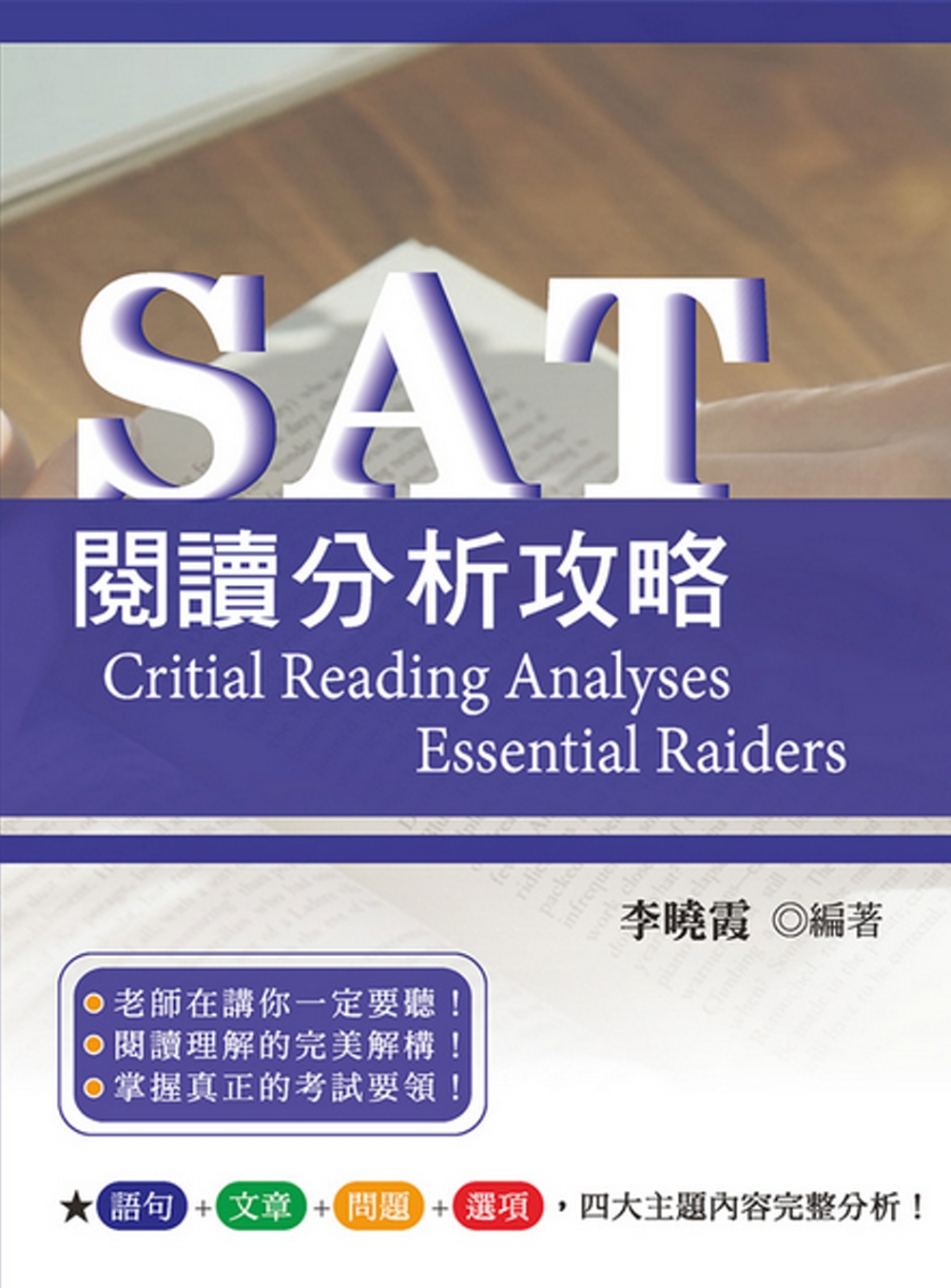為了考出好成績,務必要有充分的準備。這一章從詞彙、語法、閱讀技巧等方面給考生建議和忠告,為他們在備考過程中助一臂之力。
As the proverb says opportunities only favor those who are prepared, your success lies in your persistence and perseverance in getting yourself ready for challenges ahead. The SAT is not a test you can excel without effort. If, by any chance, you breeze through it, the chances are that other students can do it well too.
As the SAT is a norm-referenced test-Norm-referenced tests (NRTs) compare a person's score against the scores of a group of people who have already taken the same exam, your performance in the test is compared with those of the other test-takers, most of whom are native speakers of the English language in the United States. The critical reading part is difficult for American high school students, let alone for our Chinese students to whom English is a second or foreign language. To get 95 percentile in the SAT (2000 or higher out of 2400), you must do all you can to improve your reading skill and comprehension. You must read all the time to enlarge your vocabulary and consolidate your grammar knowledge.
A. Build Up Vocabulary Bank
The SAT critical reading section questions the student's understanding of the vocabulary, content and style of specific reading passages. This section is the most time demanding, with some passages taking up to 15 minutes. Vocabulary plays a key role in both sentence completion and passage comprehension, so it is necessary to boost your knowledge of SAT-level words.
a. Make use of contexts
One way to improve your vocabulary is reading. By reading a great deal, you will encounter new and valuable words. You will learn the meanings of many of these words in context by perceiving a clear connection between a new word and the words that surround it.
b. Find new words' relatives
Once you are a junior or senior, or even just a sophomore, you have already had a fairly large English vocabulary bank. Therefore, mostly probably many new words are not totally new to you. You will know their "relatives" either in meaning, spelling, pronunciation, formation, or usage.
E. figurative
•You may already know the words permanent and annual. They are perennial's relative in word formation and meaning. If you put these two words together, you can get perennial which means all-year-round, or continuing.
Continuing is a relative of perennial in meaning. Which of the five words means continuing or non-stopping? Obviously unceasing is the right choice.
In this way, you learn the word faster and retain it for a longer time.
c. Set up word webs
With unknown words, you may set up word webs, associating new words with other words new or familiar to you in spelling, meaning (similar or opposite) and usage. For instance, demography-census chide-castigate-chastise censure consent-consensus censor-censorious Censure is an SAT word. In meaning, you may associate it with chide, castigate, chastise; in meaning and spelling, censor and censorious can be easily connected with it. Censure, census, and consensus look quite similar and they can be confusing. Why don't you put them together to see how different they are and in what way? Once you know which means what, you can further expand the web to include demography, consent, etc. Learning a word in relation with other words is much easier than memorizing it in isolation. To put it in another way, setting word webs shortens the familiarization process.
d. Remember prefixes, suffixes and roots
With the exception of singular syllable words, many English words consist of a root, a suffix and/or a prefix. A root normally gives you the basic meaning of a word while a suffix may change its parts of speech and a prefix may change its meaning. For instance, the words cacophonous and prescription may look difficult for you, but if you divide them into three parts, you'll find them much easier to
understand and remember.
Though both impassionate and inflammable have the negative prefixes im-and in-, they are synonyms to passionate and flammable respectively. These are just two exceptions to the general rule of negative prefixes.
Remembering English prefixes, suffixes and roots may not solve all your vocabulary problems, it is, nonetheless, one of the useful ways to help you learn and memorize new words.
e. Cramming and rote-learning
While often considered classic and negative, cramming and rote-learning are becoming more and more common among students who would like to augment their vocabulary within a few months or only a few weeks. These ways have proved to be very effective, especially in memorizing new words.
By cramming, I suggest that you go over an SAT glossary, learn 20 to 30 words a day. Towards the end of a week, review all the words, including the sentences in which they appear. To make cramming more meaningful, you may write down all the new words you come across in a text, memorize the text. In this way not only do you get to know the new words, but also how they are used in the context.
Rote-learning sounds simplistic and childish, but if you read aloud new words several times, better still, if you use your index finger to write the word in the air or on the desk at the same time, you are making use of several of your senses (mouth, ears, eyes, finger) which enforce each other to help you learn new words through different channels.
Learning new words, especially when you try to learn many new words within a short period of time, is a constant battle against oblivion. It is said that it takes at least four or five times to encounter a new word before it stays in your memory. Given the fact that learning new words is a time-consuming process, it is better to start now and be persistent and consistent.
| FindBook |
有 6 項符合
SAT閱讀分析攻略的圖書 |
| 圖書選購 |
| 型式 | 價格 | 供應商 | 所屬目錄 | $ 299 |
閱讀技巧 |
$ 356 |
語言學習 |
$ 396 |
中文書 |
$ 396 |
英文 |
$ 396 |
Others |
$ 405 |
英語閱讀 |
|---|
| 圖書館借閱 |
| 國家圖書館 | 全國圖書書目資訊網 | 國立公共資訊圖書館 | 電子書服務平台 | MetaCat 跨館整合查詢 |
| 臺北市立圖書館 | 新北市立圖書館 | 基隆市公共圖書館 | 桃園市立圖書館 | 新竹縣公共圖書館 |
| 苗栗縣立圖書館 | 臺中市立圖書館 | 彰化縣公共圖書館 | 南投縣文化局 | 雲林縣公共圖書館 |
| 嘉義縣圖書館 | 臺南市立圖書館 | 高雄市立圖書館 | 屏東縣公共圖書館 | 宜蘭縣公共圖書館 |
| 花蓮縣文化局 | 臺東縣文化處 |
|
|
圖書介紹 - 資料來源:TAAZE 讀冊生活 評分:
圖書名稱:SAT閱讀分析攻略
★由常春藤教育SAT專家撰寫的仿真考題!
★語句+文章+問題+選項,四大主題內容完整分析!
★包攬了十年來對美國著名大學錄取標準的分析、東西方教育體制的比較!
SAT一直是全球參加人數最多的大學測驗之一,為美國各大學申請入學的重要參考條件之一,一些英國在內的許多其他國家的大學正開始承認這項考試。
對非英語母語的學生而言,SAT始終是一項艱鉅的挑戰。
本書介紹了SAT閱讀部分,對如何填空、閱讀文章、回答問題、詞彙、語法、閱讀技巧等方面給考生建議和忠告,及選擇答案作了詳盡的分析和解釋。
無論考試制度如何改變,讀懂文章始終是應考重點,書中以閱讀理解為核心,教你怎麼解構考題文章,文章篇幅再長也不怕!
本書能快速幫助考生豐富科學知識,接觸美國文化,提高英語技能,熟悉考試模式,充分認識自我,增強應試能力!
作者簡介:
李曉霞,美國夏威夷大學英語教學指南,在中國和北美地區軍事教學工作二十餘年,對東西方教學理念有深刻的了解。曾於中國,美國的學術期刊發表多篇論文 她是常春藤100教育的資深SAT教學專家,並以其嚴謹的作風,高度的熱情,極強的獨創性及紮實的文學功底博得同行和 學生的透析和歡迎。
章節試閱
為了考出好成績,務必要有充分的準備。這一章從詞彙、語法、閱讀技巧等方面給考生建議和忠告,為他們在備考過程中助一臂之力。
As the proverb says opportunities only favor those who are prepared, your success lies in your persistence and perseverance in getting yourself ready for challenges ahead. The SAT is not a test you can excel without effort. If, by any chance, you breeze through it, the chances are that other students can do it well too.
As the SAT is a norm-referenced test-Norm-referenced test...
As the proverb says opportunities only favor those who are prepared, your success lies in your persistence and perseverance in getting yourself ready for challenges ahead. The SAT is not a test you can excel without effort. If, by any chance, you breeze through it, the chances are that other students can do it well too.
As the SAT is a norm-referenced test-Norm-referenced test...
顯示全部內容
推薦序
SAT,又稱學術水準測驗考試,是一九〇一年以來美國普遍使用的大學入學考試,也是國際學生申請美國大學必須參加的考試之一。經過多年不斷地修改和完善,目前的SAT版本不僅測試考生的知識水準,而且注重考察他們運用知識和獨立思考的能力。
考生要在SAT考試中取得高分並不容易,對母語不是英語的學生來說尤其如此,所以平時持之以恆的努力和考前全力以赴的衝刺都是必要的。為了提高考生平時練習的效率,有目標地進行考前突擊複習,我們特意編寫了SAT考試指導系列。
在編寫過程中,SAT教學專家仔細研究了歷年的SAT考題,並收集了大量美國歷史...
考生要在SAT考試中取得高分並不容易,對母語不是英語的學生來說尤其如此,所以平時持之以恆的努力和考前全力以赴的衝刺都是必要的。為了提高考生平時練習的效率,有目標地進行考前突擊複習,我們特意編寫了SAT考試指導系列。
在編寫過程中,SAT教學專家仔細研究了歷年的SAT考題,並收集了大量美國歷史...
顯示全部內容
目錄
Chapter 1 Introduction and Analyses
A. About the SAT Test
B. About the SAT Critical Reading Section
Chapter 2 Preparation
A. Build Up Vocabulary Bank
B. Consolidate Grammar Knowledge
C. Read, Read, Read
Chapter 3 Tactics and Strategies
A. Before the Test
B. During the Test
Chapter 4 Practice Tests
A. Sentence Completion
B. Passage-Based Questions
C. Timed Tests
Answer Key
Explanations of Answer Key
References
A. About the SAT Test
B. About the SAT Critical Reading Section
Chapter 2 Preparation
A. Build Up Vocabulary Bank
B. Consolidate Grammar Knowledge
C. Read, Read, Read
Chapter 3 Tactics and Strategies
A. Before the Test
B. During the Test
Chapter 4 Practice Tests
A. Sentence Completion
B. Passage-Based Questions
C. Timed Tests
Answer Key
Explanations of Answer Key
References
顯示全部內容
|












